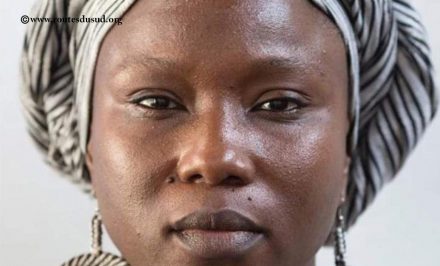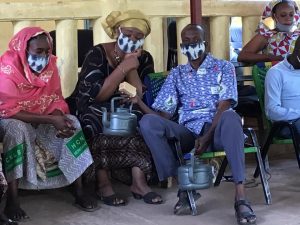 Wangari Muchiri, the Kenyan engineer committed to accelerating the ecological transition in Africa
Wangari Muchiri, the Kenyan engineer committed to accelerating the ecological transition in Africa
 Senegal: Oulimata Gueye, a curator specializing in digital technologies and arts
Senegal: Oulimata Gueye, a curator specializing in digital technologies and arts
 Susan Sagina Adongo : “At the heart of all my work is a passion for community-driven solutions”
Susan Sagina Adongo : “At the heart of all my work is a passion for community-driven solutions”
 In Kenya, Nzambi Matee turns plastic waste into bricks
In Kenya, Nzambi Matee turns plastic waste into bricks


Amidst covid -19 pandemic, Awa Meité Van Til, a Malian fashion designer, makes masks from scraps of cloth from her workshop. By launching this initiative, her objective is to allow all Malians to protect themselves from coronavirus. She produces daily 50 to 80 cotton masks and distributes them to local populations.
Awa Meité has been making nose protectors in her workshop in Bamako for several weeks. Given the difficulty of local populations to buy surgical masks and to change them regularly, she decided to make masks which can be washed and therefore reused. “We started recycling the scraps of cloth from my workshop, washing them and making mufflers,” she explains. Thereafter, “as the number was insufficient, I bought cotton fabric in bulk, so that we could make more mufflers”. These are not surgical masks, she says, but mufflers that prevent people, when coughing or sneezing, from contaminating those around them.
Each day, Awa and her team make 50 to 80 mufflers and distribute them for free to local populations. They also call on the populations to comply with hygiene measures to counter covid-19, as part of a citizen awareness initiative called “So Kadi”. “We give them masks, soap and a kettle, to allow them to wash their hands regularly. We also tell them that they should wash their masks regularly with very hot water before reusing them, “she says. To spread their messages on a larger scale, they also make short videos of good hygiene practices in Malian local languages and share them on social networks, as well as messages from Malian artists.
The initiative aims to coun ter the striking inequalities that exist not only in Mali, but in several Sub-saharan countries, when it comes to respecting hygiene measures against covid-19. “Almost 90% of the population find it difficult to offer two meals a day to their family. How can they buy masks ?”, she explains. In addition, Mali like many sub-Saharan countries face a shortage of surgical masks in pharmacies and a surge in prices on the market. At the same time, opinions differ on the efficacy and usefulness of surgical masks, cloth masks and mufflers worldwide. While some health professionals argue that the wearing of the surgical mask should only be reserved for infected persons or medical personnel, others believe that the efficiency of cloth masks cannot be certified in the absence of a study. For others, whether surgical or cloth masks, the concern is more about handling them. Therefore, they recommend a 60°c wash at least to destroy the contaminants and advise to wash hands after touching masks.
ter the striking inequalities that exist not only in Mali, but in several Sub-saharan countries, when it comes to respecting hygiene measures against covid-19. “Almost 90% of the population find it difficult to offer two meals a day to their family. How can they buy masks ?”, she explains. In addition, Mali like many sub-Saharan countries face a shortage of surgical masks in pharmacies and a surge in prices on the market. At the same time, opinions differ on the efficacy and usefulness of surgical masks, cloth masks and mufflers worldwide. While some health professionals argue that the wearing of the surgical mask should only be reserved for infected persons or medical personnel, others believe that the efficiency of cloth masks cannot be certified in the absence of a study. For others, whether surgical or cloth masks, the concern is more about handling them. Therefore, they recommend a 60°c wash at least to destroy the contaminants and advise to wash hands after touching masks.